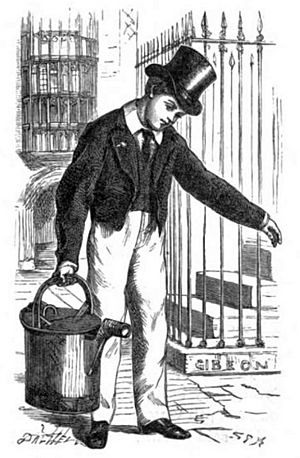Fagging facts for kids

Fagging was an old tradition in British public schools and many other boarding schools. It meant that younger students had to act as personal helpers for the oldest boys. This practice likely started even earlier, but we first hear about it in the late 1600s. Over time, it became less strict, but it continued in some schools until the late 1900s.
Contents
What Was Fagging?
Fagging was a system where older students, usually from the highest grade (called the "Sixth Form"), were given power by the school to tell younger students what to do. It was a way to keep order in boarding schools, especially when teachers couldn't be everywhere at once.
How Did Fagging Work?
Fagging had clear rules for both the older students (sometimes called "fag-masters") and the younger students (the "fags").
- Older Students' Role: The fag-master was expected to protect his fags. He was responsible for their well-being and good behavior. If a younger boy had a problem outside of class, like bullying, he would go to his fag-master for help, not a teacher. The fag-master would usually handle these issues himself.
- Younger Students' Duties: The tasks fags had to do, how much time they spent, and how they were treated varied a lot. Each school had its own customs.
Fagging Tasks Over Time
Before about 1900, fags had to do many humble jobs. These included shining shoes, brushing clothes, and even cooking breakfast. There were no limits on how many hours they might have to work.
Later, fagging became less demanding. It was mostly limited to simple tasks like running errands or bringing tea to the older student's room.
When Did Fagging End?
During the late 1900s, fagging started to become unpopular in British public schools. Ideas about boarding school education and how children develop changed. Even though older students who had been fags themselves might have wanted the system to continue, it began to disappear.
Between the 1960s and 1980s, the duties became much easier. Then, the system was completely stopped at most major public schools. Today, fagging is believed to no longer exist in Britain.
Fagging in Other Countries
Fagging also had a history in schools in former British colonies, like India and South Africa. In some schools in these countries, a very limited form of fagging might still exist.
 | Stephanie Wilson |
 | Charles Bolden |
 | Ronald McNair |
 | Frederick D. Gregory |

